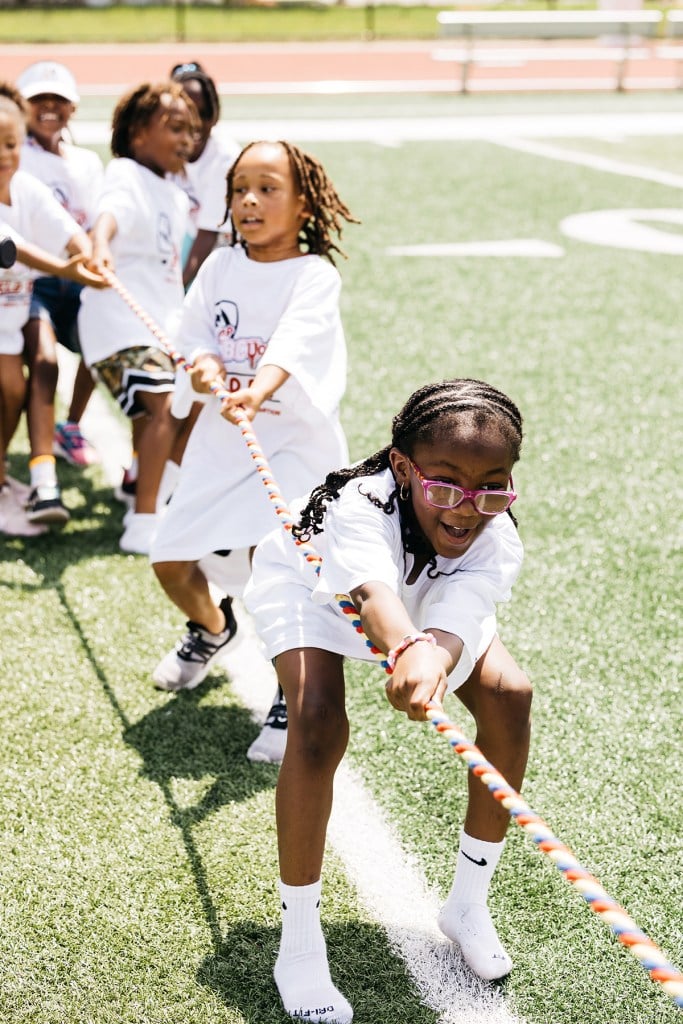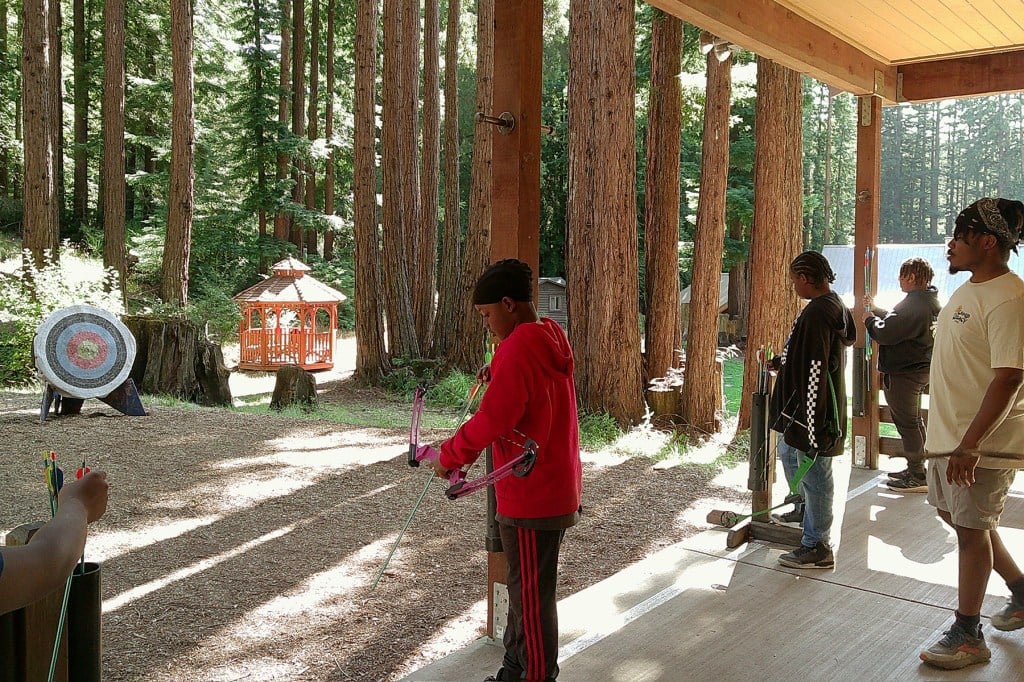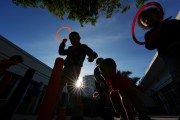In March, ChiAurelia Spencer started sketching out her 13-year-old daughter’s summer. She had four options: Should she pay for a pricey dance camp, fly her to Texas to stay with family, enroll her in summer school or leave her home alone?
For Spencer, each choice carried a cost for her family, from paying for summer programs and finding Black-led ones, to stretching her budget to cover basics like food and activities.
Navigating child care during the summer for many Black families, including Spencer’s, has become increasingly difficult as child care costs soar and affirming options for Black youth remain scarce. Summer child care is notoriously difficult to piece together, but for Black families, who also spend a larger percentage of their income on child care, it is even more difficult. When affordable and culturally sensitive camps are available, they offer far more than playtime: They can serve as community anchors for connection and support.
“As a parent, being able to give my daughter the experiences that I had at camp growing up while being in the forest, singing those camp songs, doing talent shows or learning how to make s’mores, and designed for melanated youth, was what I always wanted,” Spencer said.
When Spencer began her search for summer camps in her area of Oakland and around Northern California, she found enough programs to keep her daughter busy until school started, but before booking the activities, she realized that she would pay close to $1,100 for summer child care — something she knew wouldn’t be feasible for her family.
She and her daughter went back to the drawing board. They ultimately blended their options to create a child care plan that works for them, allowing her daughter to stay home alone some days, spend time with family and friends on others, and enjoy an affordable weekend summer camp, Camp Legacy, led by two Black women. This patchwork of care was not unique; it was how many Black families got through this summer with child care.
While the cost of programs depends largely on the location and quality, on average, summer camp tuition in the United States is around $73 to $87 a day for day camp, with sleep-away camp tuition at about $150 to $173 a day, according to the American Camp Association (ACA), a nonprofit for camp owners, professionals and summer camp programs. That price only increases for families that have more than one child.

(Camp HBCYouth)
The cost of summer camp is only increasing. In 2024, the ACA, found that camp providers increased their prices by 23 percent compared to 2023, largely driven by inflation. With camp costs on the rise, many parents in 2024 decided to either put their children in fewer, only one or no summer activities that provided opportunities to learn or refine academic, athletic, creative, social or other skills.
Experts like Jocelyn Frye, the president of the National Partnership for Women and Families, an organization that advocates for family policies, know how unaffordable child care can be a stressor for Black families.
“If you have a high number of moms who are working, then you’re going to need access to care and if you’re asking them to spend almost half their income on childcare, that’s going to not only put pressure on the entire family economically, but it’s going to make it harder for them to afford that care to begin with.”
Many Black parents like Spencer establish two main criteria while looking for summer child care: affordability and an affirming space for Black youth. Often, they have difficulty securing the type of care they believe will work best for their families, forcing them to either compromise on cost or camp experiences, and to piecemeal summer child care plans together.
As a mother of two, Yasmina White started planning child care for her 11-year-old and 5-year-old daughters in January, as she expected to use a combination of care while school was out, by leaning on family and paying for summer camp.
-
Read Next:
For her oldest daughter, White turned to Don’t Miss a Beat, Inc., a summer program in Jacksonville, Florida, that blends musical theater with community engagement. At $40 a week, the camp — which is subsidized by donors, the state and the city — offers affordable child care and a culturally affirming space for Black youth.
But she faced more challenges in finding camps for her 5-year-old. White found her daughter was ineligible for many affordable, city-run summer programs in Jacksonville because she wouldn’t be considered a public school student until starting kindergarten in August. With few other options, she pieced together care by keeping her daughter home during her hybrid work schedule and turning to her mother for help on other days until school started.
Frye said Black families often have to cobble care together by relying on free or affordable community-based organizations, church programs, relatives and in some cases, leaving children at home alone or for older siblings to care for younger siblings.
“In the absence of a sound and solid investment in access to affordable child care, families are often caught in a bind, and that’s particularly true for Black families who are going to have both greater need and often fewer resources to address the need,” Frye said.
As a single, working mom who is the primary caregiver, White is no stranger to that juggling act.
“I don’t want to burden anyone, so I just try to make it work the best way that I can,” White said.

(Young Legacies Inc)
The summer child care squeeze
Cost is typically a dealbreaker for summer child care options, especially when the price of camps continues to rise.
When the average parent spends 22 percent of their income and another 29 percent of their savings to afford child care, according to Care.com, families are squeezed tight. The U.S. Department of Health and Human Services (HHS) deems 7 percent of family income as the benchmark for affordable child care.
Spending a large portion of income on child care is a financial strain for any family, but especially for Black single parents during the summer. Prior to the COVID-19 pandemic, Black families with two children spent roughly 56 percent of their annual income on child care, the largest share of any other group. This data is the latest information on the affordability of child care for Black families from the Center for American Progress, a liberal think tank.
This pressure spills over into the summer, creates barriers and largely determines how Black families make decisions about child care. One study found that nearly seven in 10 Black families without a child in a summer program reported that they would enroll their child if a program were available to them, according to an Afterschool Alliance and Edge Research survey. The survey also found that cost, transportation and lack of information on programs are the greatest barriers to participation for families; 36 percent of Black parents stated that cost was their primary reason for not enrolling their kids in summer camps.
As a mother of four and the sole breadwinner of her household, Whitney Givens knows how summer can financially strain a family. While her oldest son no longer lives at home, this year she organized summer child care plans for her two middle sons and her youngest daughter.

Support The 19th’s ambitious plans
As part of our three-year strategic plan, we’ll keep showing up in the way you’ve told us you need us to: as your relatable guide to an unequal nation. Your support will help drive our plan forward.
Her teenagers were more independent and had straightforward plans: Her 16-year-old son was busy at an all-day football camp throughout the summer, while her 14-year-old son chose to stay home alone this summer and spend some days working with his dad at his car detailing company.
But her youngest was only 6, and planning for her required more finesse. When it came to stitching together her daughter’s summer care, cost was the thread running through every decision.
“Summer camp prices are very expensive right now, so I had to really do some shopping around before I made my decision about my daughter’s child care,” Givens said.
As a dental assistant in Charlotte, North Carolina, Givens in years past had a plan mapped out for her family’s summer, but this year she did not qualify for a state voucher that would have covered her daughter’s child care. She instead enrolled her in a Black-led summer program that cost $160 for three days a week. Her daughter went to work with Givens on the other days of the week.
“My job is very open to children coming there; we have another kid that comes there after school and waits for his mom to get off,” said Givens. “Now my daughter knows the doctors and everyone else who works there. I pack her coloring books, worksheets, a tablet and snacks to keep her occupied during the day, so I try to make it fun for her while she is there.”
-
Read Next:
With 69 percent of Black mothers as breadwinners for their families, according to a 2023 analysis from the Center for American Progress, the majority of the financial decisions weigh on their income.
“Because their work is so integral to the economic stability of their family overall, then they’re going to need support when it comes to their kids, so that’s where access to affordable child care becomes so important because Black women often have had the highest labor force participation amongst all women,” Frye said.
When parents do find a camp that fits their child care needs, it provides more opportunities for their family.

(Camp HBCYouth)
Camps as anchors of culture and community
Reagan Fresnel and Brian Wright started their summer camp to create a safe space for Black youth to learn and experience Historically Black Colleges and Universities (HBCUs).
Camp HBCYouth, an academic day camp building a pipeline of young Black learners to HBCU students, began three years ago in Atlanta.
“We’re bridging the gap between our HBCUs and the immediate communities that surround them by hosting students during these critical summer months,” Fresnel said. “This is the place where children have a safe space to learn about themselves, their HBCU culture and hopefully envision themselves one day even attending that college.”
Fresnel views summer months as a critical time for kids because of the threat of an academic slide and families experiencing food insecurity, which is why Camp HBCYouth is built on the foundation of literacy and ensures each camper is fed breakfast, lunch and an afternoon snack.
Currently, Camp HBCYouth serves mostly Black families and operates its seven-week camp at four HBCUs: Morehouse College, Tennessee State University, Clark Atlanta University and Spelman College.
“From the lesson plans that they are learning that are sensitive to not just their age, but their culture to the space that we create, it is a constantly reaffirming, grounded space for the students,” Fresnel said.
Serving more than 400 kids this summer, Camp HBCYouth establishes their relationship in each community by having Black camp counselors, leadership and mentors that support the safety and well-being of Black youth.
-
Read Next:
Camp HBCYouth charges parents between $50 to $70 a day for camp, making it slightly more affordable than the national average. They also offer a sliding scale fee for camp costs and provide before care for parents who need to drop kids off before camp begins at 10 a.m. and after care for kids who need to be picked up after camp ends at 3 p.m.
“We believe that summer camp is the perfect avenue when school is out,” Fresnel said. “Where do parents send their children? Where is a safe space where they can learn when school is out and parents can still go to work? Camp is the answer to help solve some of these needs in our community or alleviate other issues that might be happening at home during the summer months.”
Other Black-led summer programs are working to provide families with a similar experience, like Camp Legacy, an overnight, weekend summer camp in California built to expose Black youth to the outdoors.
Twin sisters Alex and Angelica Young started their summer program three years ago to provide Black families with a camp they wished they had when growing up.
“We know that a lot of Black youths’ access to the outdoors is limited due to historical barriers, racial barriers and the way people market their camps,” Angelica said. “Because we know the benefits of summer camp and the limited access to it, we want to be a small piece of the puzzle to getting more Black youth into the summer camp experience and having that be a part of the Black community’s experience.”
While Camp Legacy mostly serves Black youth in Oakland, they also extend their camp experience to families from around the state.
This year, the Young sisters shuttled 42 young Black fourth-through eighth-graders to Santa Cruz, California, where they arrived to an all-Black camp staff, among other Black kids.
“We really like to organically build community, safety and comfort,” Alex said. “A lot of that has to do with our staff training, by telling them that this space is for Black joy.”
-
Read Next:
At $65 for the weekend, Camp Legacy uses grants and outside funding to pick up 75 percent of the cost for families to enroll children at a more affordable rate. This covers lodging, meals, camp swag and transportation for the entire weekend.
“We want to lower the barriers of coming to camp by allowing people to understand how important it is to be a part of this community, the summer camp community,” Angelica said. “We are always asking ourselves how we make sure parents understand what camp is and how affordable it can be if they’re willing to invest in it.”
This year, Camp Legacy saw three campers return for their weekend summer program, one of whom was Spencer’s daughter.
“From the first time she went to the camp, she did not stop talking about it from the moment she got home until the next year when it was time to apply for camp again,” Spencer said. “She was on me and asking, ‘Hey, did you remember that camp applications are coming out? Please don’t forget to apply so that I can go.’”
Spencer wanted to send her daughter to Camp Legacy to afford her the opportunity of summer camp like she had as a kid.
After camp last year, Spencer’s daughter came home with a new friend. They stayed connected throughout the year and both attended Camp Legacy again this June. Their friendship has blossomed into a community for the Spencer family that often looks like supporting the friend’s child care plans, hangouts and sleepovers.
“Being able to be in spaces where you are understood, feel seen, feel like you can absolutely be yourself and not have to hide any parts of you is so important,” said Spencer.
Great Job Alexis Wray & the Team @ The 19th Source link for sharing this story.







